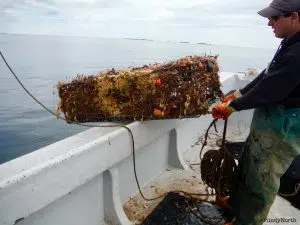A New Brunswick fishermen’s association is trying to come up with ways to recycle end-of-life lobster traps.
The Fundy North Fishermen’s Association has received funding through the federal government’s Ghost Gear Fund.
Executive director Lillian Mitchell said there are several ways to recycle fishing lines and rope, but there is no responsible way to dispose of lobster traps.
“We’ve considered some ways to recycle lobster traps before, but this is really the first project where we’re gonna have the dedicated funds to really tackle that,” said Mitchell.
The association, based in Saint Andrews, will receive more than $96,000 over two years toward the project.
It is the latest initiative the fishermen’s association has undertaken to address lost and abandoned fishing gear, or “ghost gear”.

The Fundy North Fishermen’s Association retrieves end-of-life lobster traps from the water. (Submitted/Fundy North Fishermen’s Association)
Since 2008, the association has spearheaded several projects to retrieve lost gear and either repurpose or recycle it. Mitchell said they have been focusing on repurposing both rope and lobster traps over the past few years.
“We’ve looked at making retaining walls out of old lobster traps and we had quite a bit of interest in that under a Habitat Stewardship Program grant that we had been working on,” said Mitchell.
“There was a lot of success there in repurposing lobster traps that way. People come up with such amazing, creative ideas on how to reuse some of the stuff, so that was really exciting to see.”
There have also been discussions on different uses for fishing rope and how it can be upcycled and absorbed into other areas, she said.
Mitchell said their hope is to find solutions for recycling traps locally and scale it throughout Atlantic Canada, such as they have done with ghost gear retrieval.
The $8.3-million Ghost Gear Fund will fund 22 projects in Canada and four internationally over the next two years.
Another New Brunswick group, the Maliseet Nation Conservation Council, will work with COJO Diving and the Marine Debris Strategic Action Committee to develop safe and effective methods for removing ghost gear from known locations.
According to Fisheries and Oceans Canada, ghost gear is one of the largest contributors to marine litter around the world and poses serious danger to marine animals, the coastal and marine environment, and global fishing stocks.




